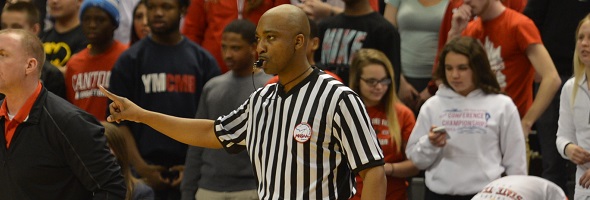
Be the Referee: Cheer Safety
February 17, 2016
This week, MHSAA assistant director Mark Uyl explains how rules in competitive cheer keep Michigan's athletes as safe as possible.
Be The Referee is a series of short messages designed to help educate people on the rules of different sports, to help them better understand the art of officiating, and to recruit officials.
Below is this week's segment - Cheer Safety - Listen
Cheerleaders – usually at the college level - get in the sports headlines whenever an accident occurs causing a serious injury. In Michigan, the sport of Competitive Cheer doesn’t make the news in that regard.
Why? Because this sport, created by Michigan schools, has built in safety guidelines for competition, including the proper matting, rules which prohibit dangerous stunts, and safety judges observing the routines whose responsibility is to detect, record and report safety violations when they occur and to penalize those who commit them.
This format is exclusive to Michigan and just another way that high school sports take the extra step to make the games our children play as safe as they can possibly be.
Past editions:
Feb. 11: Primary Areas - Listen
Feb. 4: Block/Charge Calls - Listen
Jan. 28: Dive on the Floor - Listen
Jan. 21: Hockey Officials' Options - Listen
Jan. 14: Recruiting Officials - Listen
Jan. 7: Wrestling Weight Monitoring - Listen
Dec. 31: Respect for Referees - Listen
Dec. 24: Basketball Instant Replay - Listen
Dec. 17: Basketball Communication - Listen
Dec. 10: Basketball Excessive Contact - Listen
Nov. 26: Pregame Communication - Listen
Nov. 19: Trick Plays - Listen
Nov. 12: 7-Person Football Mechanics - Listen
Nov. 5: Make the Call: Personal Fouls - Listen
Oct. 29: Officials Demographics - Listen
Oct. 15: Make the Call: Intentional Grounding - Listen
Oct. 8: Playoff Selection - Listen
Oct. 1: Kick Returns - Listen
Sept. 24: Concussions - Listen
Sept. 17: Automatic First Downs - Listen
Sept. 10: Correcting a Down - Listen
Sept 3: Spearing - Listen
Aug. 27: Missed Field Goal - Listen

Official Feedback
June 10, 2014
We receive much unsolicited comment about the performances of officials and the conduct of spectators. Here’s some of what the MHSAA does to actively solicit input from its key constituents.
Since 1956, the MHSAA has required member schools to provide numerical ratings of officials who work their contests. Since 1998, the system has also allowed schools to cite particular areas of perceived weakness; and doing so is required whenever a school provides a rating of “5” (worst) on the 1-to-5 scale.
There are many deficiencies in a system like this, including that it sometimes means that coaches or administrators are doing the rating, and some of them have never officiated and may not know the rules and mechanics as well as the officials. The rating can also be affected by whether the school won or lost.
Nevertheless, the system has value, not as a true evaluation of an official’s performance for any particular contest, but – when the ratings of all schools are combined over a three-year average – as a number that the official can use to understand his or her abilities relative to all other officials. And it’s a number the MHSAA can use, along with recommendations of local officials associations and assigners, when considering assignments to various levels of MHSAA tournaments.
It is also noteworthy that for 25 years, the MHSAA has used a reporting form allowed in some cases and required in others, whereby officials report unusual events to the MHSAA office immediately after contests. During a typical fall season, about 300 such reports will be filed; about 250 each winter season; about 200 each spring season. Any school which receives three or more negative reports over three seasons receives a letter of concern from the MHSAA and the school’s name is published in benchmarks; and any school that receives no such reports over three seasons receives a letter of praise.
In 2008-09, the MHSAA also began a program whereby officials could rate school sportsmanship. During the winter season of 2013-14, there were approximately 4,000 reports filed, including 2,400 in basketball. The Basketball Coaches Association of Michigan honors the best 100 schools where BCAM members are coaching.

